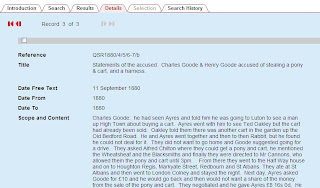The Quarter Session Rolls throw up criminals of all ages and the sheer gall of some is quite impressive. Take Joseph Pugh....a man of 63 years and described as a carpenter.
Joseph appeared to be of no fixed abode and his crimes followed a similar pattern.
In fact the Epiphany Session of 1890 has him up before the Court on 3 very similar offences.
The first instance was on 15 October 1889, when he arrived at the house of Mrs Lucy Evans of Marston Moretaine asking to lodge with her until the beginning of April. He promised to pay 3s a week and so she accepted him as her lodger. As soon as he got into the house he asked her to write him a letter to the general manager of the North Western Railway, Mr Findlay. Furthermore, he then asked her to lend him a penny for a stamp. The letter said:
“Will you please forward to the above address my month’s money as soon as you receive this letter as I have quite run out. The amount is 10 shillings.”
Lucy Evans signed Joseph Pugh at his request.
Pugh had a full sob story to tell Mrs Evans.
He told her that until recently he had been a patient in a London hospital
. He told her he was in receipt of a pension of 14 shillings a week for as long as he lived from the railway but that he had lost half a sovereign the Friday before and it had made him rather short of money. Having had such terrible luck, he asked her to fund his food until his money came and then, in return, he would pay her 12 shillings a week. Pushing his luck even further, Pugh also asked her to lend him some money to go to Millbrook station so he could collect his clothes, which he said were coming to Millbrook
by train. She lent him a shilling and sixpence for the purpose. On 18 October he left the house to go to the station and saying he wouldn't be long. He never went back. He left owing 5 shillings for board and lodging and took with him the shilling and sixpence she had lent him.
Joseph Pugh goes on to commit similar offences and tell similar stories in Wootton and Ampthill.
Pugh's written plea must have evoked sympathy for the ageing ailing man. (see the photo attached)
The courts sentence him to just 7 days in the House of Correction.
Unsurprisingly, an old dog doesn’t learn new tricks and Mr Pugh pops up again in the next quarter.
This time in Sharnbrook where he convinces his landlady he had been advised by his doctor to take in the country air!
He didn’t quite gain so much sympathy from the Justices this time, as he was sentenced to a calendar months hard labour.
QSR1890/1/5/2a
QSR1890/1/5/2b
QSR1890/1/5/2c
QSR1890/2/5/1
 This week I came across the case of a stolen mare and a stolen headstall (part of a bridle). The case itself wasn't one of the more interesting we've come across but the offender was ...... a young man by the name of George Champkin. A quick check on Ancestry showed he was indeed father to Arthur. It just goes to prove the depth of information we're making available online for family historians.
This week I came across the case of a stolen mare and a stolen headstall (part of a bridle). The case itself wasn't one of the more interesting we've come across but the offender was ...... a young man by the name of George Champkin. A quick check on Ancestry showed he was indeed father to Arthur. It just goes to prove the depth of information we're making available online for family historians. 












 Extract from the Bedfordshire and Luton Archive and Records Service catalogue
Extract from the Bedfordshire and Luton Archive and Records Service catalogue
